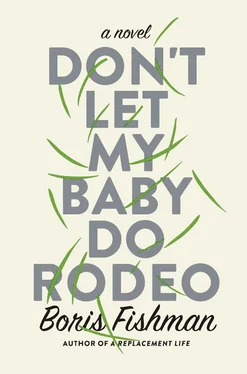A man at the counter was watching Maya; the manager? Maya tried to avoid his eyes, which bored into her with a glinting amusement — she did not feel up to another correction. The stains of paint on his jeans and his wrists, and his shoulder-torn sweater, would have made her think he was poor — Maya thought everyone in the American West would be poor — but the sweater was thickly woven, and his knife and fork were poised above his eggs with a strange delicateness, as if he was shy to cut in. A book was open next to his plate.
“Sit down, if you’re looking to order,” he said to Maya. “They don’t know what to do with you if you’re standing.”
Maya colored, feeling the interloper’s familiar cluelessness. It, not Alex, was her true life’s companion. Just when she began to get free of the feeling, she mispronounced a word or failed to apprehend some invisible rule, and lived the next days like a guest, a cherry pit of self-reproach in her stomach. How was one to know these things? The hostess podium said: “Please wait to be seated.”
“My son just needs to go to the bathroom,” she said timidly. Because she was trying hard to pronounce the words without an accent, she sounded to herself like someone who’d arrived yesterday. But the man only smiled in that American way, at once vacuous and reassuring, out of grayish-green eyes. With the tip of his butter knife, he indicated an alcove at the end of the counter.
“You can just go?” Maya said. “It isn’t only for customers?” Now, Maya was intent on scrupulously observing laws both written and unwritten. She would be the Badlands Diner’s most desirable customer. She would cause no further provocation this morning.
He plucked an inverted cup from a long tray with two handles shaped like buffalo skulls and set it to the right of him. “There,” he said. “You’re a customer.”
Maya knelt before Max. “It’s just that way, honey.”
“Come with me,” Max whispered.
“I can’t go with you. Girls can’t go into the bathroom with boys.”
“You have to wait just one minute,” the man said. “The Furies are in there right now.”
The bathroom lock cracked open and two teenage girls tumbled out. Giggling, they made their way down the counter. It was plain that they were sisters from their heavy legs and soft, swimming cheekbones, but their laughter rang out differently — one hid it in her chin and the other, a year or two older, sang it out. They were Laurel’s age when she delivered her son, if not older. But they were children, just children. But Laurel, in her home, had felt like a woman. The laws for each person are different. Maya saw the girls’ father in the strict cut of their mouths, the eyes glowing gray-green and mossy like his. They were like the same words in two slightly different languages. On the father’s face she saw a reticent satisfaction. Seated, the older one tried to steal an egg from his plate. She got the yolk, which dripped all over the counter, setting off a fresh round of laughter. He tried to get a corner of her shirt to wipe it, and she yelled. The waitress with the bank haircut laid down a pile of napkins on the counter without looking at anyone and went into the main room with a coffeepot.
Maya watched with the helplessness of someone behind glass; she was watching others live out their lives, the rituals familiar but incomprehensible. Max squirmed, and, smiling weakly at the man, she led her son down the length of the counter. “I’m right here,” she said, kneeling in front of him. Max took the knob of the door, looked back at his mother resentfully, and disappeared inside.
She craved coffee. Her head felt attached to the rest of her only by the stem of pain that rose from its base. Of course she could have taken Max into the bathroom; she had abandoned her son for coffee. Not knowing where else to go, she sat at the counter, by the cup waiting for her. The man squinted at her. He had a pleasantly shaped face that headed toward but missed handsomeness. The long, narrow nose flared out slightly on one side; the lips were thin; and his skin showed age. But it missed well. The features added up to make a coarse but appealing American face. She liked its Americanness, a different kind of Americanness than what she was used to. The face studied her with a slight sneer — the upper lip was up slightly — or maybe it was amusement again. The inspection was not unfriendly, something forest-like to the eyes, lush and somnolent. Melancholy — or maybe Maya was hoping; she felt a monopoly on despair while the rest of the world celebrated. He was not young — Maya liked this as well, because she felt disheveled and old. Up close, his eyes were grayer than green, baleful not playful.
“They’re nice girls,” she said, and nodded toward them. They were staring at the screen of a cell phone.
She remembered she had not brushed her teeth. Was wearing yesterday’s clothes. Bedding down in the bucket seat of a Ford Escape had sprung half her ponytail loose, and several strands hung in front of her eyes. Her usual instincts were asleep. With frantic casualness, she tried to feed her hair back into the ponytail. And then she was out of steam even for this simple mission, her hair falling over her shoulders. Her fingers worked the unemployed hair band.
The man studied the short-order window. In her sleepiness, she was touched by the intensity with which he gazed at it — he was looking for something to say. Of course the waitresses would have found her at the podium — he had wanted her to sit at the counter.
Finally, he turned to Maya and said, “In this book”—he indicated it with the tip of his knife; the spine said 21st Century Parenting—“ they talk about how when a ewe lambs, it’s mystified by what’s come out of it. It wants nothing to do with that baby mess. She’ll sniff the lamb and head butt it down in the straw. But after a time, they’re inseparable. If the lamb dies, the ewe won’t take another. You have to skin the dead guy and sit that new pelt on some unmothered lamb, and smear the pelt with the dead liver. And little by little, the mother will agree to be fooled.”
Maya laughed — loudly, lavishly. She understood nothing except the keenness with which the speaker had spoken. He was older — at his temples, his hair, which came high off his forehead before falling past his ears, was flecked with gray — but he was not the only one at the counter with gray hair. She was ready to forget this about herself as readily as her occasional accent. There was no end to the things that needed forgetting. She saw the look of dismay on his face and beseeched him with her hands.
“I’m sorry — I wasn’t laughing at what you said.”
“I’m just blurting away,” he said. “I’ve had too much coffee, and you none.”
“Is it that bad?” Maya said, touching her hair.
“No. .” he started, and she also held up her hands — they stared at each other in an awkward silence, then both laughed lightly, then looked away, then looked back at each other, and finally, he drove a hand at her.
“Marion Hostetler,” he said. Again, she saw the beads of paint on his wrist. She wanted to scrape them off, like crumbs off a tablecloth. She took his hand. How quickly a trip revised what seemed normal; she was shaking another man’s hand in a diner. But this is what Americans did; they just started talking to each other, a nation with the oafish amiability of the slightly touched.
“I slept in the car,” Maya said, trying to explain her appearance. It made her sound homeless.
“I’ve got no excuse,” he said. “I go on sometimes. Isn’t that so, girls?”
“Daddy, we love you,” the older one said. When she wasn’t laughing, she had a deep, reasonable voice.
Читать дальше












